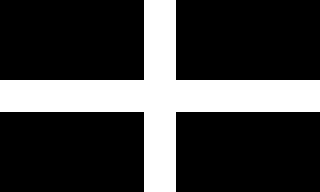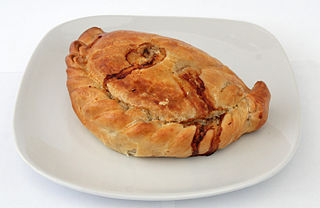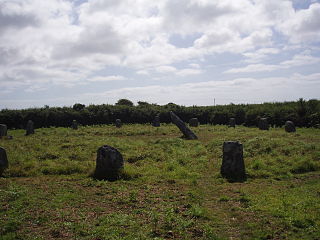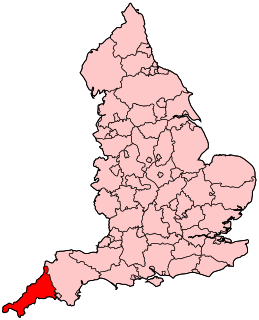Related Research Articles

The Brittonic, Brythonic or British Celtic languages are alleged to form one of the two branches of the Insular Celtic language family; the other is Goidelic. The name Brythonic was derived by Welsh Celticist John Rhys from the Welsh word Brython, meaning Ancient Britons as opposed to an Anglo-Saxon or Gael.

Cornwall is a ceremonial county in South West England. It is recognised as one of the Celtic nations and is the homeland of the Cornish people, maintaining a distinct cultural identity that reflects its history; including the Cornish language, a recognised minority language. Cornwall is bordered to the north and west by the Celtic Sea, to the south by the English Channel, and to the east by the county of Devon, with the River Tamar forming the border between them. Cornwall forms the westernmost part of the South West Peninsula of the island of Great Britain. The southwesternmost point is Land's End and the southernmost Lizard Point. Cornwall has a population of 568,210 and an area of 3,563 km2 (1,376 sq mi). The county has been administered since 2009 by the unitary authority, Cornwall Council. The ceremonial county of Cornwall also includes the Isles of Scilly, which are administered separately. The administrative centre of Cornwall is Truro, its only city.

Cornish is a Southwestern Brittonic language of the Celtic language family. It is a revived language that became extinct as a first language in Cornwall in the late 18th century. A revival began in the early 20th century. The language is often described as an important part of Cornish identity, culture and heritage. Cornish is currently recognised under the European Charter for Regional or Minority Languages. It has a growing number of second language speakers. A few parents are inspired to create new first language speakers, by teaching their children the language from birth.

A pasty is a baked pastry, a traditional variety of which is particularly associated with Cornwall, United Kingdom. It is made by placing an uncooked filling, typically meat and vegetables, on one half of a flat shortcrust pastry circle, folding the pastry in half to wrap the filling in a semicircle and crimping the curved edge to form a seal before baking.

Cornish College of the Arts (CCA) is a private art college in Seattle, Washington, founded in 1914.

Lostwithiel is a civil parish and small town in Cornwall, England, United Kingdom at the head of the estuary of the River Fowey. According to the 2001 census it had a population of 2,739, increasing to 2,899 at the 2011 census. The Lostwithiel electoral ward had a population of 4,639 at the 2011 census. The name Lostwithiel comes from the Cornish "lostwydhyel" which means "tail of a wooded area".

The history of Cornwall goes back to the Paleolithic, but in this period Cornwall only had sporadic visits by groups of humans. Continuous occupation started around 10,000 years ago after the end of the last ice age. When recorded history started in the first century BCE, the spoken language was Common Brittonic, and that would develop into Southwestern Brittonic and then the Cornish language. Cornwall was part of the territory of the tribe of the Dumnonii that included modern-day Devon and parts of Somerset. After a period of Roman rule, Cornwall reverted to rule by independent Romano-British leaders and continued to have a close relationship with Brittany and Wales as well as southern Ireland, which neighboured across the Celtic Sea. After the collapse of Dumnonia, the remaining territory of Cornwall came into conflict with neighbouring Wessex.

The Truro River is a river in the city of Truro in Cornwall, England, UK. It is the product of the convergence of the two rivers named Kenwyn and Allen which run under the city: the Truro River flows into the River Fal, estuarial waters where wildlife is abundant, and then out into the Carrick Roads. The river is navigable up to Truro.

The culture of Cornwall forms part of the culture of the United Kingdom, but has distinct customs, traditions and peculiarities. Cornwall has many strong local traditions. After many years of decline, Cornish culture has undergone a strong revival, and many groups exist to promote Cornwall's culture and language today.

The hundreds of Cornwall were administrative divisions (hundreds) into which Cornwall, the present day administrative county of England, in the United Kingdom, was divided between c. 925 and 1894, when they were replaced with local government districts
Celliwig, Kelliwic or Gelliwic is perhaps the earliest named location for the court of King Arthur. It may be translated as 'forest grove'.

The River Valency is a short river in north Cornwall, England, UK, with many small tributaries. After running past Lesnewth it cuts a valley before entering the sea at the harbour of the village of Boscastle. One of its tributaries is the Jordan, which runs 2 kilometres (1.2 mi) north before joining the Valency in Boscastle just before the B3263 road bridge.

Michaelstow is a civil parish and village in north Cornwall, England, United Kingdom. The village is about three miles (5 km) south of Camelford. The hamlets of Fentonadle, Trevenning and Treveighan are in the parish.

The River Tiddy is a small river in south-east Cornwall, the main tributary of the River Lynher. The Tiddy rises near Pensilva and flows south east past the village of Tideford until it joins the Lynher just after passing St Germans. The name of Tideford derives from its location on the river, literally meaning "Ford on the River Tiddy".

The River Menalhyl is a river in Cornwall, England, that flows through the civil parishes of St Columb Major and Mawgan-in-Pydar. Its length is about 12 miles and it flows in a generally north-west direction. The name comes from the Cornish words melyn meaning mill and heyl meaning estuary - estuary mills. The name was recorded as Mellynheyl in the 19th century, but it had been known as Glyvion.
Cornish surnames are surnames used by Cornish people and often derived from the Cornish language such as Jago, Trelawney or Enys. Others have strong roots in the region and many in the UK with names such as Eddy, Stark or Rowe are likely to have Cornish origins. Such surnames for the common people emerged in the Middle Ages, although the nobility probably had surnames much earlier on. Not until the later Middle Ages did it become necessary for a common man to have a surname. Most surnames were fully established throughout Cornwall by the end of the 15th century. Today Cornish surnames can be found throughout the world as part of the Cornish diaspora.
Common Brittonic was a Celtic language spoken in Britain and Brittany. It is also variously known as Old Brittonic, British, and Common or Old Brythonic.

The following outline is provided as an overview of and topical guide to Cornwall: Cornwall – ceremonial county and unitary authority area of England within the United Kingdom. Cornwall is a peninsula bordered to the north and west by the Celtic Sea, to the south by the English Channel, and to the east by the county of Devon, over the River Tamar. Cornwall is also a royal duchy of the United Kingdom. It has an estimated population of half a million and it has its own distinctive history and culture.

The River Lerryn is a river in east Cornwall, England, UK, a tributary of the River Fowey. The Lerryn is the largest of the tributaries which enter the estuary of the Fowey. The river is tidal up to the village of Lerryn. The landscape of the Lerryn catchment is rural and includes heathland, moorland and rough pasture in the upper reaches and broadleaf, coniferous and mixed plantation woodland in the lower. This catchment includes four SSSIs, including Redlake Meadows & Hoggs Moor. The Lerryn rises at Fairy Cross on the southern slopes of Bodmin Moor and flows south-southwest until it enters the Fowey estuary.
Presented below is an alphabetical index of articles related to Cornwall:
References
- ↑ Place-names in the Standard Written Form (SWF) : List of place-names agreed by the MAGA Signage Panel. Cornish Language Partnership.
- ↑ Ordnance Survey One-inch Map of Great Britain; Land's End, sheet 189. 1961
| This article about a location in the former district of Kerrier, Cornwall is a stub. You can help Wikipedia by expanding it. |